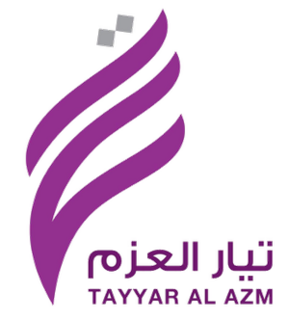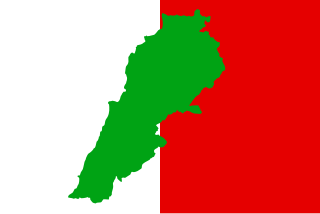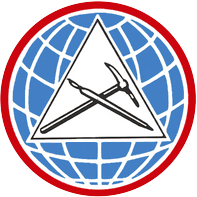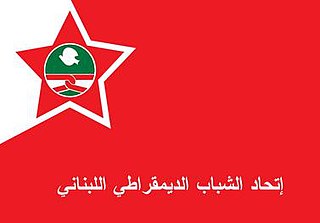 W
WThe 2011 Lebanese protests, also known as the Intifada of Dignity or Uprising of Dignity were seen as influenced by the Arab Spring. The main protests focused on calls for political reform especially against confessionalism in Lebanon. The protests initiated in early 2011, and dimmed by the end of the year. In another aspect of the Arab Spring, Lebanese pro and anti-Assad factions descended into sectarian violence, which culminated in May–June 2012.
 W
WThe Azm Movement is a political party in Lebanon, founded and led by former Prime Minister Najib Miqati.
 W
WThe Democratic Left Movement is a nonsectarian and a democratic leftist political party. It was founded in September 2004 by left-wing and center-left intellectuals and activists some of whom had previously split from the Lebanese Communist Party (LCP) while some were student activists from the "Independent Leftist Groups". The DLM affirms a European-style social democracy—but is open to all forms of leftism and encourages the development of a true secular state. The party operates under a decentralized framework that emphasizes diversity of thought for a progressive democratic society in a liberal democratic environment. It participated in the 2005 Cedar Revolution, a wave of demonstrations against the Syrian occupation of Lebanon, and calls for correcting imbalanced relations with Syria.
 W
WThe Democratic Renewal Movement is a reformist, social liberal, secular political party in Lebanon.
 W
WThe Green Party of Lebanon is a Lebanese green political party. Founded in August 2008, the green party advocates environmental protection, sustainable development, and human rights in Lebanon. It is the first Lebanese party to focus primarily on Green politics.
 W
WThe Independence Movement is a sovereigntist, reformist and secular center-right political party based in Zgharta (Lebanon), founded in 2006 by Michel René Moawad, son of the assassinated Lebanese President President René Moawad and first lady Nayla Moawad; a formal Member of the Lebanese Parliament.
 W
WLebanese Laïque Pride, also Laïque Pride, Laic Pride, or Secular Pride, is a Lebanese secularist group. It broadly advocates for secularism, women's rights, and media freedom. The group advocates for "equality among all Lebanese citizens and the separation of religion and politics." The group is opposed to confessionalism.
 W
WThe Lebanese Democratic Party is a political party in Lebanon established by Prince Talal Arslan and Marwan Abou Fadel in 2001. Prince Talal is the son of Lebanese Druze leader Emir Magid Arslan and has presided the party ever since its establishment.
 W
WSecularism in Lebanon began under a 1920s French mandate, continuing under different governments since independence. Lebanon is a parliamentary democracy within an overall confessionalist framework; as a form of consociationalism, the highest offices are proportionately reserved for representatives from religious communities.
 W
WThe National Bloc is a secular political party in Lebanon.
 W
WThe New Lebanese Party is a Lebanese political party established in 2006.
 W
WThe Progressive Socialist Party is a Lebanese political party affiliated with the Druze sect. Founded by Kamal Jumblatt in 1949, the party is led by his son Walid since 1977.
 W
WThe Syrian Social Nationalist Party (SSNP) is a secular nationalist political party operating in Lebanon, a branch of pan-Syrian Social Nationalist Party. It advocates subsuming Lebanon into a Greater Syrian nation state spanning the Fertile Crescent.
 W
WUnion of Lebanese Democratic Youth (ULDY), also known as UJDL, is a Lebanese leftist secular democratic youth organization as it defines itself in its documents. ULDY was legally established in 1970 by leftist—mainly communist—students and young activists, after being active underground since 1945.
 W
WThe Union party is a Lebanese political party based in Bekaa but with presence in most of the Lebanese areas and led by former minister Abdelrahim Mourad. The party is officially secular and its ideology is Nasserism.